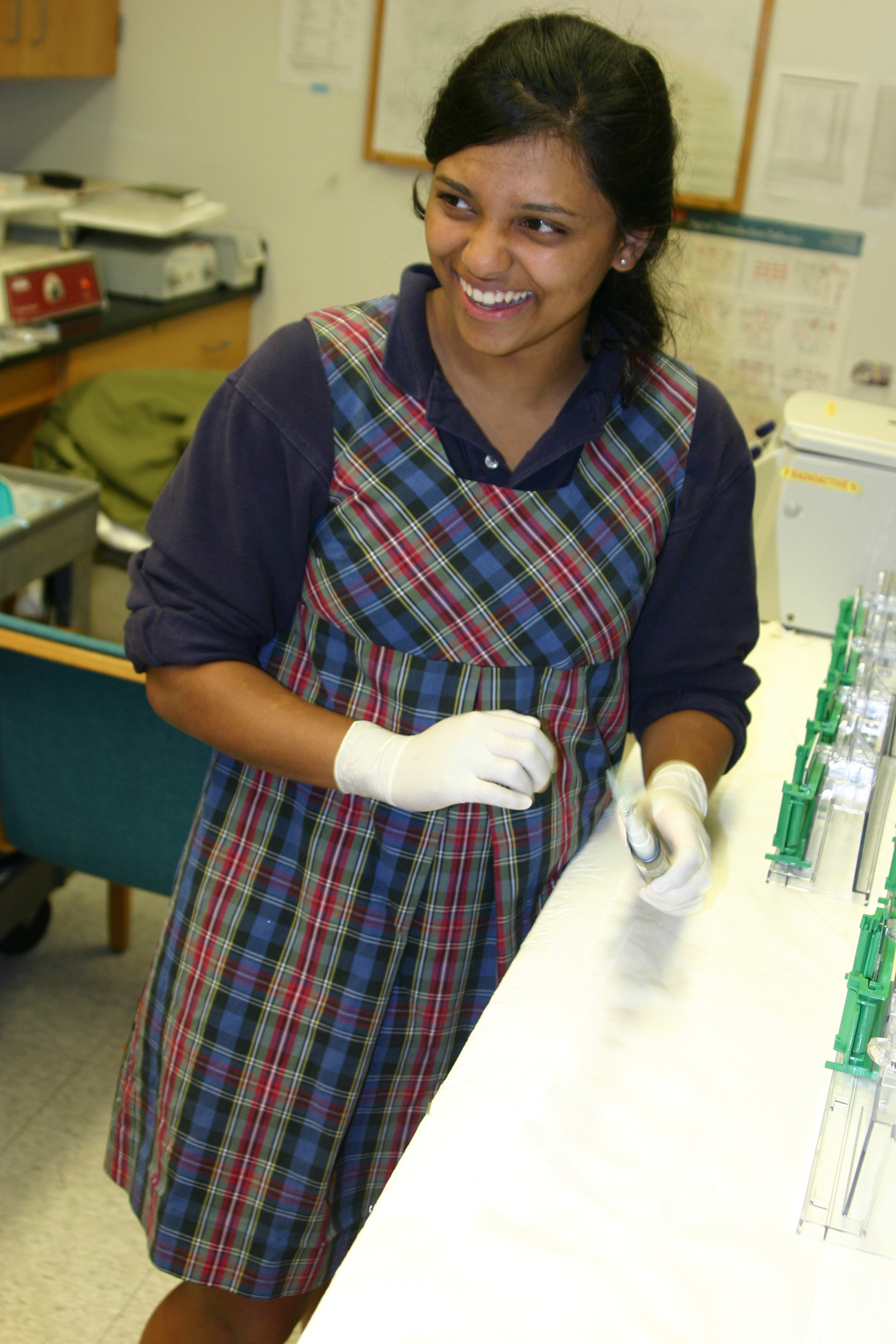Look no further than Shree Bose for proof that motivation and perseverance can open wondrous doors. The Fort Worth Country Day School senior spent her high school summers volunteering at a science lab and working on cancer research.
Now she’s weighing scholarship offers from the country’s elite universities, with Harvard and Stanford topping the list. She has won trips to the Galapagos Islands and Switzerland. She was featured in a national magazine alongside entertainment mogul Jennifer Lopez.
Oh yeah, and she’s made two trips to Washington, D.C., to hang out with President Barack Obama. When she was ushered into the Oval Office for the first time, last fall, Bose was surprised by the president’s reaction.
“He turned around and said, ‘Hey, you’re Shree Bose, working on ovarian cancer, right?’ I thought, ‘The president knows me!’ That doesn’t happen every day.”
J-Lo and the president are cool, but her most exciting moment was getting to spend time with Bill Nye the Science Guy during a White House function.
“He had a science show on [TV] when I was growing up,” she said. “I may or may not have sung his own theme song to him. I think he thought I was a freak. Most of my friends were more excited about me meeting Bill Nye than the president.”
All of these magic moments from the past year trace back to Bose’s persistence in landing an internship at the University of North Texas Health Science Center in 2009. Her work as a lab tech on an ovarian cancer project in 2010 earned her the grand prize at the first international Google Science Fair in 2011. The award included a $50,000 scholarship and travel to faraway places.
“She is amazing,” said Savitha Sridharan, a UNT graduate student who mentored Bose. “She has an understanding much beyond her high school years. She was able to pick up techniques very quickly.”
There’s no question that Bose is brainy. She’s in the top 10 students in her high school class. But she’s also a typical teen, giggling often and making self-deprecating remarks. She laughed at herself for arriving at a recent photo shoot wearing her dowdy high school uniform.
What makes her so special is her dogged work ethic, said UNT Molecular Biology and Immunology professor Alakananda Basu. Many of Basu’s peers in the academic world won’t work with high school students, but Basu has a knack for spotting young science whizzes and training them.
As a youngster, Bose was enamored with art and poetry, but by second grade she discovered her love of science from her brother, Pinaki.
“My older brother was the science kid of our family, and he’d come home and teach me all the science things he learned,” she said. “I remember falling in love with how science could explain the world in a way that completely made sense. When I got to freshman biology, I loved this idea that a billion cells came together on a whim and decided to be you for a while, a life.”
She’s been entering science fairs since second grade. Her early science projects ranged from turning spinach blue to building a remote-controlled garbage can.
The stereotype about girls not being good at math or science is falling away, Bose said. Girls fared well at science fairs that she entered over the years, and the professors and undergrad students she worked with at UNT were mostly women.
“A lot of the barriers and stereotypes are breaking down. The Google Science Fair is a small manifestation of that. I can see an exciting future for young women everywhere as they step up into science,” Bose said.
The winners in the younger categories at the Google fair were also girls, a fact Obama noted in a videotaped speech at the National Women’s Law Center annual awards dinner in November.
“That next generation of smart, powerful women, they’re already knocking on the door,” he said. “Last month I got the chance to meet the winners of the Google Science Fair. This is an international competition of high school students, the cutting edge of technology and science. All three of the winners turned out to be Americans. All three were girls.”
The crowd broke into long applause.
“They had beat out more than 10,000 other applicants from more than 90 countries,” Obama continued. “One of the winners, Shree Bose, discovered a promising new way to improve treatment for ovarian cancer at the age of 17. It’s people like Shree … who make me hopeful about the future.”
Despite their successes, women represent only about 25 percent of employees in fields like science, technology, engineering, and math, according to the Association for Women in Science, a leadership organization that’s been fighting for equity and career advancement for women since 1971.
Bose isn’t sure where she’ll go to college or what career she’ll pursue, but she wants to be in the medical field and to help people. Obama’s watching her progress. He also mentioned Bose during another videotaped speech, this one at the National Medals of Science, Technology, and Innovation awards ceremony.
[pullquote_left]“She also told me very matter-of-factly that she’ll be going to medical school and getting a doctorate, and I suspect she will do so,” the president said. [/pullquote_left]
Bose put herself in that position by refusing to give up in the face of rejection. She applied for dozens of internships in 2009 before landing a spot. She laughs now when she recalls the e-mails sent to potential mentors. They began, “Hi, my name is Shree Bose and I’m 15 years old.” Most professors rejected or ignored her. Basu, however, decided to give her a chance.
Basu assigned Bose to a research project involving hormonal therapy in breast cancer patients that first year. Bose knew little about lab techniques, but she learned quickly and never turned down a chance to spend time in the lab. She spent at least 20 hours a week there for two months.
Bose entered that first research project in a regional science fair in 2010. She lost and almost let the failure get her down.
“I was crying and acting very angsty and terrible about it,” she said. “I took that one really hard.”
But the next year she secured another UNT internship to study the long-term effectiveness of the chemotherapy drug Cisplatin on ovarian cancer cells that grow resistant over time. Bose’s research explored ways to counteract this resistance, and cited the role of a particular enzyme in maintaining cellular energy levels. The project was considered groundbreaking, although more study is needed and currently being continued by Basu.
The November edition of Glamour magazine included Bose as one of its 21 Young Amazing Women of the Year, and the Fort Worth teen got to hobnob with stars at the awards banquet at Carnegie Hall.
“I got to sit in the front row and have my name called by [actress] Emma Stone, and I was literally 10 feet away from Jessica Alba, Jennifer Lopez, Lea Michelle, and Gloria Steinem,” she said. “I got to shake hands with Laura Bush and Condoleezza Rice, and it was so amazing to see these incredible, powerful women in person. Seeing their poise, grace, and beauty made it so clear to me why these women were so successful.”
Spending much of her high school years closed up in a lab caused her to miss out on some of the typical teen social events, but she regrets nothing.
“When I was not hanging out with friends, I liked hanging out with these amazing grad students in the lab,” she said. “My friends are excited for me. They’ve seen me work my butt off for the past four years, and they’re excited to see where I’ll go in the future. I feel the same way.”











